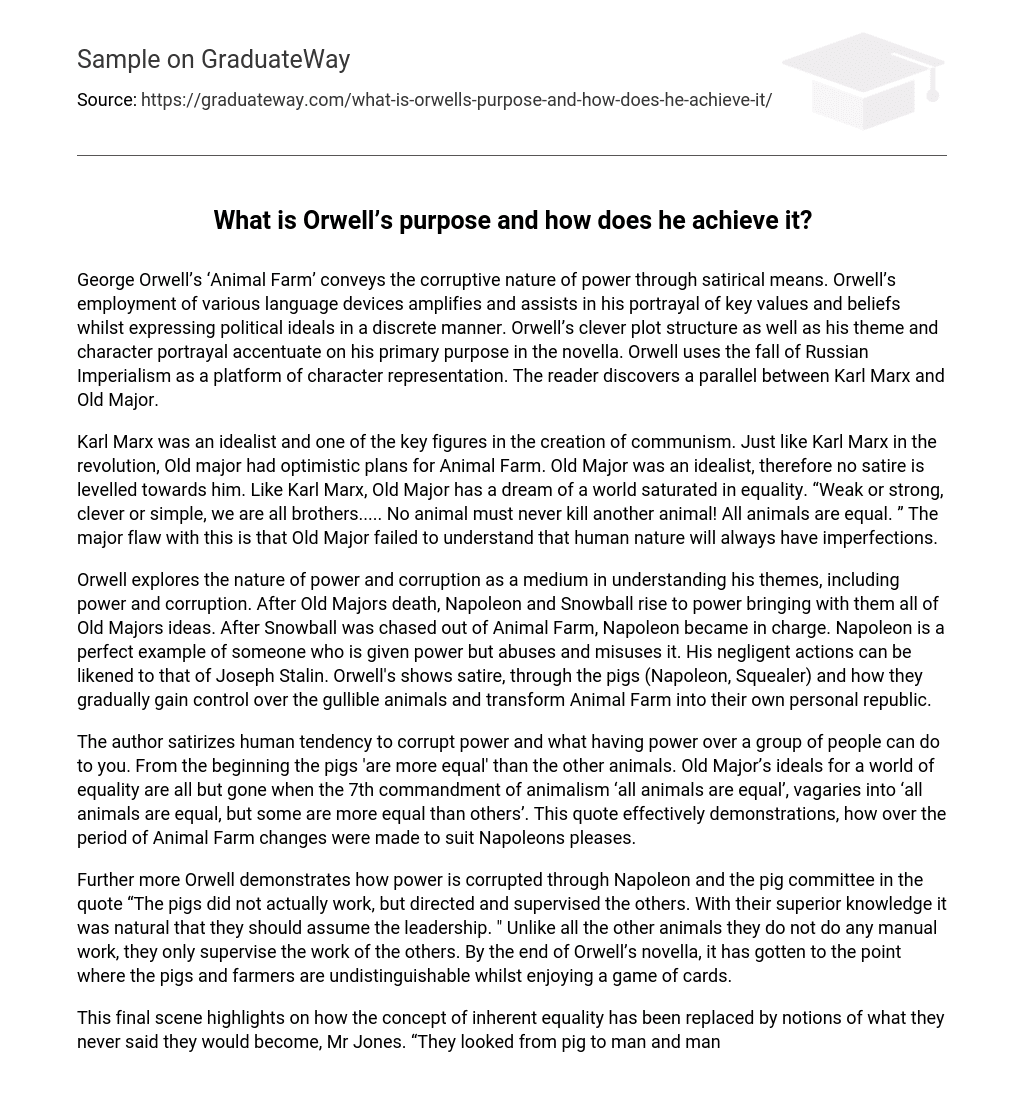George Orwell’s ‘Animal Farm’ conveys the corruptive nature of power through satirical means. Orwell’s employment of various language devices amplifies and assists in his portrayal of key values and beliefs whilst expressing political ideals in a discrete manner. Orwell’s clever plot structure as well as his theme and character portrayal accentuate on his primary purpose in the novella. Orwell uses the fall of Russian Imperialism as a platform of character representation. The reader discovers a parallel between Karl Marx and Old Major.
Karl Marx was an idealist and one of the key figures in the creation of communism. Just like Karl Marx in the revolution, Old major had optimistic plans for Animal Farm. Old Major was an idealist, therefore no satire is levelled towards him. Like Karl Marx, Old Major has a dream of a world saturated in equality. “Weak or strong, clever or simple, we are all brothers….. No animal must never kill another animal! All animals are equal. ” The major flaw with this is that Old Major failed to understand that human nature will always have imperfections.
Orwell explores the nature of power and corruption as a medium in understanding his themes, including power and corruption. After Old Majors death, Napoleon and Snowball rise to power bringing with them all of Old Majors ideas. After Snowball was chased out of Animal Farm, Napoleon became in charge. Napoleon is a perfect example of someone who is given power but abuses and misuses it. His negligent actions can be likened to that of Joseph Stalin. Orwell’s shows satire, through the pigs (Napoleon, Squealer) and how they gradually gain control over the gullible animals and transform Animal Farm into their own personal republic.
The author satirizes human tendency to corrupt power and what having power over a group of people can do to you. From the beginning the pigs ‘are more equal’ than the other animals. Old Major’s ideals for a world of equality are all but gone when the 7th commandment of animalism ‘all animals are equal’, vagaries into ‘all animals are equal, but some are more equal than others’. This quote effectively demonstrations, how over the period of Animal Farm changes were made to suit Napoleons pleases.
Further more Orwell demonstrates how power is corrupted through Napoleon and the pig committee in the quote “The pigs did not actually work, but directed and supervised the others. With their superior knowledge it was natural that they should assume the leadership. ” Unlike all the other animals they do not do any manual work, they only supervise the work of the others. By the end of Orwell’s novella, it has gotten to the point where the pigs and farmers are undistinguishable whilst enjoying a game of cards.
This final scene highlights on how the concept of inherent equality has been replaced by notions of what they never said they would become, Mr Jones. “They looked from pig to man and man to pig; but it was impossible to say which was which. ” Further more, the literary technique irony is incorporated to further Orwell’s purpose ‘It did not seem strange to learn that the pigs had brought themselves a wireless set, were arranging to install a telephone, and has taken out subscriptions Daily Mirror.
It did not seems strange when Napoleon was seen strolling in the farm house garden with a pipe in his mouth – no, not even when the pigs took Mr Jones’ clothes out of his wardrobe and put them on. ’ Sections of Orwell’s novella are related to significant past historic events based on the fall of the Russian imperialism. The main characters Napoleon, Snowball and Old Major parallel to key figures in the Russian revolution, Joseph Stalin, Leon Trotsky and Karl Marx. Several events during the novella correspond to the actions of history.
For example, when Snowball is chased out of Animal farm by Napoleon. After a while of effective collaboration the rivalry between them grew. The antagonistic relationship between them and the hostile scene symbolises the lead up to when Stalin had Trotsky assassinated. ‘Nine enormous dogs came bounding into the barn and dashed straight to snowball’. The nine enormous dogs represented the secret ‘army’ that Stalin created to have snowball expelled. ‘They dashed straight for Snowball’. After Trotsky expulsion, Stalin (Napoleon) became the only leader.
The way, in which Napoleon controlled Animal farm can be comparable to Stalin’s actions throughout the Russian revolution. Napoleon altered laws and ways of living. “From now on the Sunday morning meetings would come to an end… all questions on the farm will be settled by a special committee of pigs. ” This quote effectively highlights how Napoleon begun to take control of Animal Farm. Allegory is effectively used throughout out the fable (in particular snowball’s removal), as numerous events resemble the significant historic events of the Russian imperialism.
The novella Animal Farm by George Orwell portrays various representations to similar events of the Russian Imperialism. Orwell depicts his purpose by demonstrating how power can be dishonoured and abused. The satirical fable parallels with various significant events in history, which acts as basis for the main events in Animal farm. The satirising of characters and themes is heavily emphasised as it creates not only a humorous effect but also an effective medium in portraying Orwell’s key ideals.





